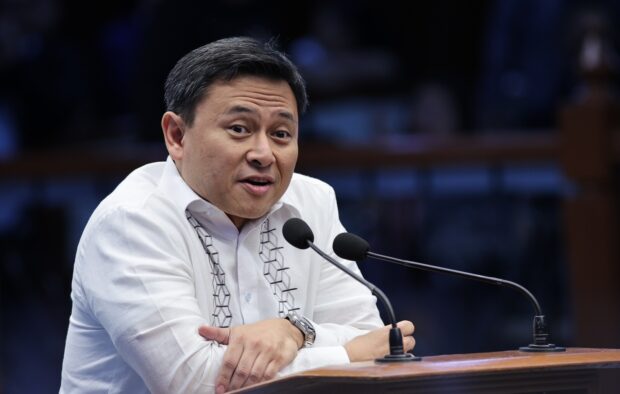
Sen. Sonny Angara (Joseph Vidal / OSEC-Social Media Unit)
MANILA, Philippines — Senator Juan Edgardo “Sonny” Angara on Friday said there should be flexibility in the economic provisions of the 1987 Constitution to allow the country to adjust to worldwide economic trends.
Angara made the pronouncement amid Resolution for Both Houses (RBH) No. 6, which seeks to amend certain economic provisions in the 1987 Constitution, and is currently being discussed by the Senate
“Hindi tayo pwedeng sumabay sa kilos o hugis ng pandaigdigang ekonomiya. Yung ibang bansa nagpapasa lang sila ng batas, nagpapasa sila ng polisiya, tayo mag-aamyenda pa tayo ng Saligang Batas to adjust to economic trends worldwide,” he said in a statement, adding that amending certain economic provisions is the sole purpose of the proposed Charter change.
(We cannot simply follow the actions or shape of the global economy. While other countries only pass laws or policies, we even go as far as amending the Constitution to adjust to worldwide economic trends.)
According to Angara, some proponents of RBH No. 6 attributed the lackluster performance of the country’s foreign direct investment to the restrictive and non-investor-friendly economic policies in the Constitution, while opponents point to corruption, red tape and the high cost of doing business as stumbling blocks.
Angara, however, assured the public that the Senate will thoroughly discuss RBH 6, with a public hearing set on Monday, February 12.
Angara, who leads the Subcommittee on Constitutional Amendments and Revisions of Code, said among the invited resource persons are representatives from the Makati Business Club, the Philippine Chamber of Commerce and Industry, and the Management Association of the Philippines.
The senator said their participation in the discussion of RBH 6 aligns with President Ferdinand “Bongbong” Marcos Jr.’s recent pronouncement, where he reassured that his administration is just after the Charter’s economic provisions that hinder the entry of foreign investments.
Last week, the Senate panel invited legal luminaries, among them former Chief Justice Hilario Davide, Associate Justice Adolf Azcuna, Associate Justice VV Mendoza and former Commission on Elections Chairman Christian Monsod, who are all constitutional experts.
Angara said more legal experts are expected in the coming public hearings, which he said, may take place on a weekly basis, with those from the legal community and other members of the 1986 Constitutional Commission expected to participate in future hearings.
He added that future hearings will include a specific session dedicated to the proposed changes to address the barriers to foreign investment to the education sector.